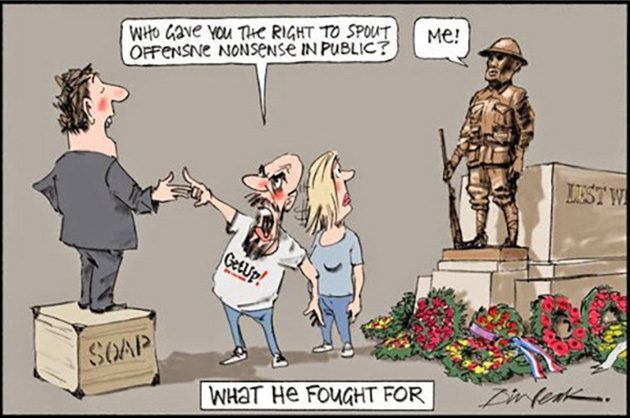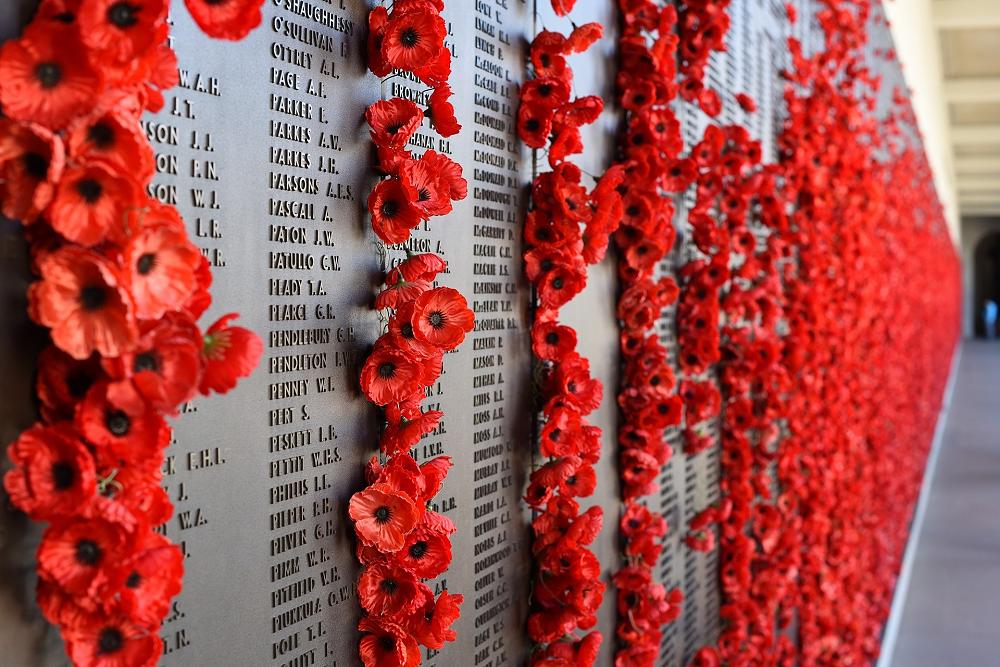Opinion
The disgraceful hijacking of Anzac Day services by anti-Jewish leftists — particularly galling, given that Australia’s brilliant WWI commander, John Monash, was Jewish — are proof that, even as we solemnly commemorate Anzac Day, we are in grave danger of forgetting just why it is so important.
The Gallipoli landings were seen as significant from the beginning, because they were seen as marking the new nation’s (Australia had only been a nation for 14 years) debut on the world stage. But, first Gallipoli, then the Western Front, were part of a war that shaped the nation for decades. While we commemorate the sacrifice of the Anzacs, modern Australians often fail to comprehend the sheer scale of the sacrifice the young nation really made.
Perhaps symbolically, the Avenues of Honour planted at the entrances to country towns all over Australia (325 in Victoria alone) are nearing the ends of their lives. Trees already over a century old are in danger of dying off. There are moves to plant new trees, to keep the Avenues as a living memorial to the sacrifice of the Great War.
It would be a great loss, if the Avenues indeed withered away. Few things short of a visit to a French war graveyard can bring home the sheer scale of WWI. I vividly remember driving along the Avenue of Honour outside Ballarat in Victoria, on a foggy night years ago. As tree after tree after tree passed by in the mist, it was if the ghost of every fallen Anzac was marching past — thousands of them, for over 20 kilometres.
This, remember, in just one country town, as the now-city would have been, in 1914-18.
It’s difficult for Australians today to understand the real cost of what fleetingly became known as the war to end all wars. We had lost a generation of men, some killed on the battlefield, others returned home bearing the physical and psychological scars of the conflict. Just two decades old, the nation reeled from the trauma of war and the shock of it would carry on for another twenty years.
Almost 40% of the male population aged 18-44 enlisted.
62,000 died, 167,000 were wounded, 87,865 died of illness including by the pneumonic influenza known as the Spanish flu pandemic […] The Great War exacted a toll in every corner of the country. It was as if a giant wrecking ball had struck the nation. Vestiges of war were on every street corner. Sydney’s then focal point, Central Railway Station featured a cavalcade of men horribly disfigured by war eking out a living from handouts.
The seismic shock of the War played out at home over the next decade in ways often unacknowledged today, particularly crime. In the TV series Peaky Blinders, the violent crimes of the titular gang are repeatedly tied to their wartime experiences. Bringing home tens of thousands of men who had endured the horrors of the Western Front and leaving them to sink or swim on their own had grimly predictable consequences.
Crime rates, often a reflection of social discord, grew. Property crime rates remained low but crimes against the person – assaults, manslaughter and murder spiked to the highest numbers in our history. 106 years later there remains no parallel to the rates of violent offending in Australia in the 1920s.
Men were demobbed en masse and often allowed to return home with their service revolvers, some on occasions with their rifles. Many were psychologically damaged by war and became brooding presences in their homes.
Gun crime in NSW became such a concern that in 1924, the state government introduced legislation where anyone found to be in possession of an unlicensed firearm received a mandatory 12 month jail term. In the mother of all unintended consequences, men not keen to serve a year in the slammer reached instead for straight razors as their weapon of choice.
The cost of the War exacted a brutal toll on the nation’s economy, as well.
Australia’s public debt in 1914 was two per cent of gross domestic product. By war’s end, it was 50 per cent of the nation’s annual output, much of the debt incurred by way of loans to Britain’s independent banks. While there was economic growth in Australia in the first half of the 1920s, the world wool and wheat price went into free fall in the latter part of the decade and our highly protected economy slipped back.
After the Wall Street collapse in 1929, the US called in its war loans, many of whom sat with the British banks. The British bankers in turn called in their loans to Australia. War debt combined with loans for public works programs undertaken by the Bruce Government meant that Australia was perilously close to being unable to service its interest payments.
Unlike mendicant developing nations today, there was no debt forgiveness.
Instead there was interest payment relief for just two years. When the Great Depression hit and official unemployment rates hit 25 per cent of the workforce (in reality it was closer to 50 per cent unemployed), the Australian government was unable to provide any meaningful financial support to workers and families.
The shadows of war would continue to drag the young nation backwards until another one came along.
The Australian
In the wake of WWII, at least Australia’s political class learned the lessons of the post-WWI failures.
At the end of the war, Australian politicians of all parties knew their country had achieved a narrow escape. They learned from the experience. Sure that their nation in the next war could not defend itself without a much larger population and a strong industrial base, they conducted in the quarter century from 1945 to 1970 ambitious forms of nation-building.
One of those nation-building programs was the famous boom of post-War migration. Using that, as “Big Australia” and open borders advocates try to do today, misses another key lesson from the past. As historian Geoffrey Blainey reminds us, there is a key difference between immigration then, and today.
We forget that they did not just seek migrants as such. They sought people – new Australians – whose first loyalty would unfailingly be to Australia.
The Australian
Now, they seem to go out of their way to seek migrants who hate Australia almost as much as they do, while encouraging them to violently enact their imported tribal hatreds on Australian streets.
At the same time as they are scuppering the industrial base that post-War leaders knew was so vital to the nation’s defence.


